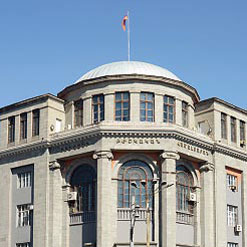Health Care System
 Armenia’s health care system features three principal components: the national or “republican” service level, which provides tertiary care hospitals and an epidemiological service; the regional service level, which provides hospitals; and the municipal and community service level, which has primary health care providers. The key components of the system are the large private hospitals. Socially vulnerable and special-status social groups are provided with Medicare, including services for the disabled, children under 18 without parental care, victims of political repression, military personnel, expectant mothers, victims of traffcking, and children under age seven, among other groups. These groups also receive free or discounted medicine.The system is undergoing constant improvement and refnement. Heart surgery, therapy, dentistry and other medical specialties are currently being improved in the country. Implementation of a mandatory medical insurance system began in 2012, which will further boost the development of the healthcare system. During the frst stage of the new system, public offcials will receive insurance as part of a social package provided by the government.
Armenia’s health care system features three principal components: the national or “republican” service level, which provides tertiary care hospitals and an epidemiological service; the regional service level, which provides hospitals; and the municipal and community service level, which has primary health care providers. The key components of the system are the large private hospitals. Socially vulnerable and special-status social groups are provided with Medicare, including services for the disabled, children under 18 without parental care, victims of political repression, military personnel, expectant mothers, victims of traffcking, and children under age seven, among other groups. These groups also receive free or discounted medicine.The system is undergoing constant improvement and refnement. Heart surgery, therapy, dentistry and other medical specialties are currently being improved in the country. Implementation of a mandatory medical insurance system began in 2012, which will further boost the development of the healthcare system. During the frst stage of the new system, public offcials will receive insurance as part of a social package provided by the government.
Armenia’s health system has witnessed several notable recent success stories
- The Nork Marash Cardiology Center has become a leading international center for cardio surgery, attracting many patients from CIS and Middle East countries. International assistance (particularly with the involvement of the Armenian Diaspora) and exchanges signifcantly contribute to the upgrading of skills and introduction of new treatment methods.
- Yerevan Medical University trains the largest number of international students in Armenia. Relatively affordable prices and highly-qualifed professionals represent a comparative advantage of the Armenian health care sector, and Armenia has considerable potential to become the leading health care provider in the region.
Table 2. Armenia: Health care system statistics
| Number of physicians of all specialities | 13,591 |
| Number of hospital facilities | 130 |
| Number of ambulatory-policlinic facilities | 504 |
| Number of medium-level medical personnel | 18,649 |
| Number of hospital beds (thousand) | 12.2 |
| Physicians density | 4.02 physicians/1,000 population |
| Hospital bed density | 3.7 beds/1,000 population |
Source: Health Information-Analytic Center NIH MOH RA, Annual Statistical Report 2010


































 Health Care System
Health Care System